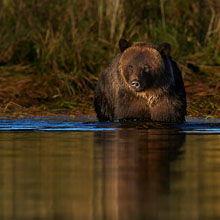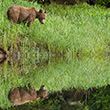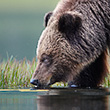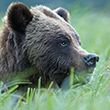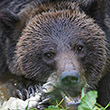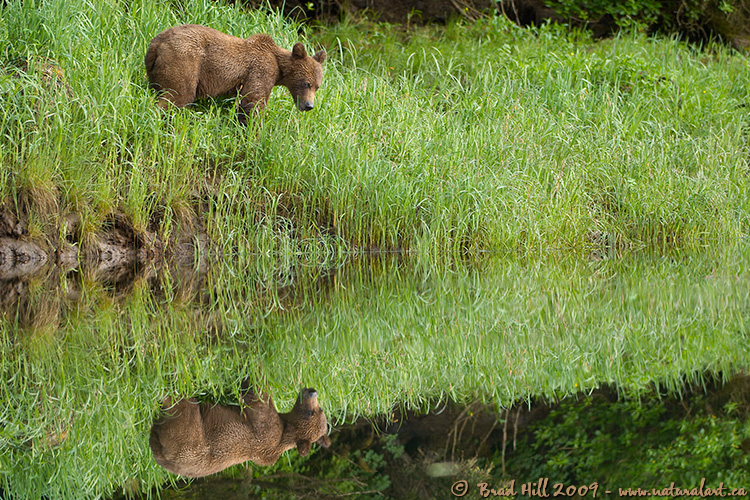
Availability: Limited Edition Print; RM Stock (??)
In the Field
Where Land Meets Water. Khutzeymateen Inlet, BC, Canada. June 4, 2006.
Yes...this is a real reflection and not a product of digital wizardry. It was high tide in the Khutzeymateen Inlet and the river had more-or-less quit flowing for several hundred metres upstream of where it met the ocean. And it was dead calm. And this young grizzly just happened to wander near the boundary of land and water. So...PRESTO...amazing reflection and amazing moment! Thanks Photeus!
Behind the Camera
Where Land Meets Water. Khutzeymateen Inlet, BC, Canada. June 4, 2006.
Digital Capture; Compressed RAW (NEF) format; ISO 200.
Nikon D2X with Nikon 70-200mm f/2.8G ED-IF AF-S VR lens @ 200 mm (300 mm equivalent with digital conversion factor) - hand held (VR turned to "On" and in "Normal" mode)
1/90s @ f4; no compensation from matrix-metered exposure setting.
At the Computer
Where Land Meets Water. Khutzeymateen Inlet, BC, Canada. June 4, 2006.
RAW Conversion to 16-bit TIFF, including first-pass sharpening, using Phase One's C1 Pro.
All further digital correction on 16-bit TIFF file using Adobe's Photoshop CS2, including selective saturation enhancement and selective sharpening for web output.
Conservation
Where Land Meets Water. Khutzeymateen Inlet, BC, Canada. June 4, 2006.
Ten percent of the revenue generated by this image will be donated to Raincoast.
Species Status in Canada*: Special Concern (May 2002).
While Grizzly Bears (Ursus arctos) are not technically listed as "Endangered" in Canada, they have been extirpated from most of their historical range. Grizzly Bears are far more sensitive to intrusion/disturbance in their habitat than are Black Bears and are being increasingly forced into marginal habitat by human encroachment. The Great Bear Rainforest along the central and northern coast of British Columbia is one of the last strongholds of the Grizzly Bear in Canada, and even this population is coming under increasing pressure.
On December 18, 2017 the government of British Columbia banned grizzly hunting across the entire province. This major conservation victory came after decades of tireless work by many dedicated conservationists and ecologists and, most importantly, it reflects the opinion of the vast majority of British Columbians. And, it means that AT LEAST while the current government remains in power grizzlies are finally "safe" in British Columbia.
Now that we've at least temporarily won the battle to save grizzlies in BC, it's time to re-focus our efforts toward protecting ALL of BC's carnivores, including Gray Wolves, Black Bears, Cougars, Wolverines, and more! Simply put, there are no ecological, economic, or ethical arguments supporting the trophy hunting of carnivores.
In a great first step towards ending the hunting of carnivores throughout BC the Raincoast Conservation Foundation has developed a program designed to protect ALL carnivores within the Great Bear Rainforest. Details about this program can be found on this page on Raincoast's website. Check it out and, better yet, make a donation to help Raincoast purchase the remaining commercial hunting tenures in the Great Bear!
*The Raincoast Conservation Society (and Foundation) is an effective and efficient organization that has been fighting for protection of this unique habitat. If you are looking for a meaningful way to contribute to the conservation of this amazing ecosystem, Raincoast will provide maximal "bang" for your conservation dollars.
For more information on the status of Grizzly Bears in Canada, go to: http://www.speciesatrisk.gc.ca and search under "Grizzly Bears".
*as determined by COSEWIC: The Committee on the Status of Endangered Wildlife in Canada


















